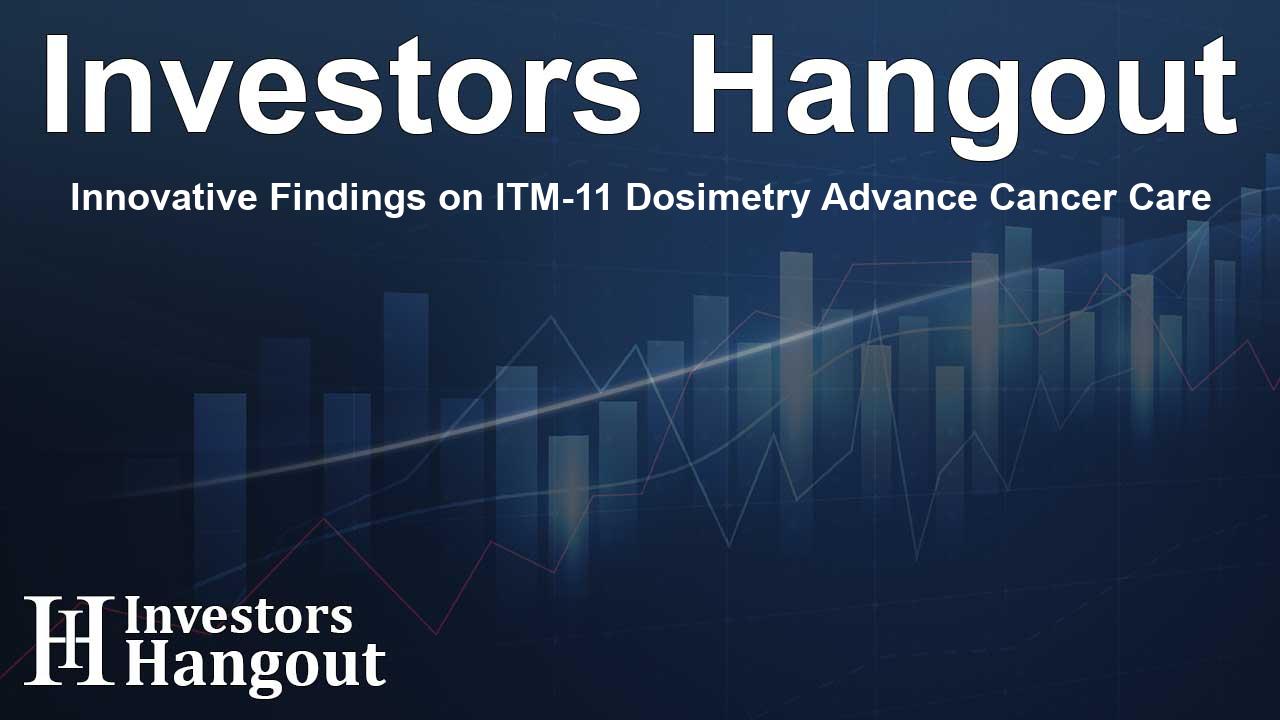Innovative Findings on ITM-11 Dosimetry Advance Cancer Care

Exciting Developments in Dosimetry for ITM-11
ITM Isotope Technologies Munich SE (ITM), prominent in the radiopharmaceutical sector, has unveiled critical dosimetry data highlighting the efficacy and safety of its investigational agent, n.c.a. 177Lu-edotreotide, commonly known as ITM-11. This breakthrough was showcased in the Phase 3 COMPETE trial, which focused on patients with Grade 1 and Grade 2 gastroenteropancreatic neuroendocrine tumors (GEP-NETs).
Key Findings from the COMPETE Trial
The recent findings demonstrated that ITM-11 effectively targets tumors while safeguarding healthy tissues, making it safer for patients. Conducted on 207 participants, the dosimetry evaluations have underscored the agent’s promising therapeutic potential. These outcomes significantly contribute to the body of research on nuclear medicine, earning the abstract presented at EANM the elective Marie Curie Award.
Dosimetry and Its Importance
Dosimetry assesses the radiation absorbed by tumors and normal organs, which is crucial for understanding the effectiveness of radiopharmaceuticals in treating cancer. In the COMPETE trial, researchers observed that ITM-11 consistently delivered high doses of radiation to tumors while minimizing exposure to healthy organs. This balance is vital for ensuring patient safety and optimizing therapeutic outcomes.
Investigator Insights and Implications
Dr. Emmanuel Deshayes, a key investigator in the study, expressed excitement over the extensive dosimetry data gathered from over 200 patients. He noted how this information could inform better therapeutic decision-making, benefiting patient management and treatment personalization.
Comparative Safety Metrics
Further analysis revealed that Grade ?1 renal adverse events occurred less frequently in patients receiving ITM-11 compared to those treated with everolimus, emphasizing the safety profile of this novel treatment. The trial established that the normal organ absorbed doses remained significantly below safety thresholds, reinforcing the drug's safety for long-term use.
Upcoming Trials and Future Research
Following the promising results from the COMPETE trial, ITM plans to apply this dosimetry foundation to its ongoing Phase 3 COMPOSE trial. This upcoming study will involve patients with more aggressive SSTR-positive GEP-NET tumors, aiming to further validate the effectiveness of ITM-11. Moreover, ITM is set to launch the Phase 1 KinLET pediatric study, emphasizing its commitment to advancing treatment options across diverse patient populations.
Contribution to Medical Standards
Looking forward, ITM has joined forces with the Foundation for the National Institutes of Health (FNIH) to enhance dosimetry standards in clinical applications. This collaboration aims to standardize imaging and dosing protocols, ultimately enriching the safe usage of radiopharmaceuticals in cancer treatment.
Conclusion
With ongoing research and commitment to patient safety, ITM continues to pioneer advancements in the treatment of neuroendocrine tumors. The recent findings from the COMPETE trial position ITM-11 as a leading option in targeted cancer therapies, aligning with the company’s mission to improve patient outcomes through innovative radiopharmaceutical solutions.
Frequently Asked Questions
What is ITM-11, and what is its significance?
ITM-11 is an investigational radiopharmaceutical designed to target gastroenteropancreatic neuroendocrine tumors with a focus on maximizing tumor radiation while minimizing impact on healthy tissues.
What were the main findings from the COMPETE trial?
The trial demonstrated that ITM-11 effectively targets tumors with lower adverse effects on healthy organs, showing a favorable safety and efficacy profile compared to alternative treatments.
What recognition did the COMPETE trial receive?
The abstract featuring the dosimetry findings from the COMPETE trial received the Marie Curie Award for its significant contributions to nuclear medicine research.
How does dosimetry impact patient treatment decisions?
Dosimetry provides essential data on radiation absorption in tumors versus healthy tissues, guiding clinicians in tailoring treatment plans that optimize effectiveness while ensuring patient safety.
What are the next steps for ITM following these findings?
ITM will continue its research pipeline with trials such as the COMPOSE study for advanced tumors and the pediatric KinLET study, aimed at expanding treatment applications for diverse patient groups.
About The Author
Contact Kelly Martin privately here. Or send an email with ATTN: Kelly Martin as the subject to contact@investorshangout.com.
About Investors Hangout
Investors Hangout is a leading online stock forum for financial discussion and learning, offering a wide range of free tools and resources. It draws in traders of all levels, who exchange market knowledge, investigate trading tactics, and keep an eye on industry developments in real time. Featuring financial articles, stock message boards, quotes, charts, company profiles, and live news updates. Through cooperative learning and a wealth of informational resources, it helps users from novices creating their first portfolios to experts honing their techniques. Join Investors Hangout today: https://investorshangout.com/
The content of this article is based on factual, publicly available information and does not represent legal, financial, or investment advice. Investors Hangout does not offer financial advice, and the author is not a licensed financial advisor. Consult a qualified advisor before making any financial or investment decisions based on this article. This article should not be considered advice to purchase, sell, or hold any securities or other investments. If any of the material provided here is inaccurate, please contact us for corrections.
